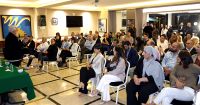More than 250 St. John’s University students, faculty, and administrators joined diplomats, community leaders, and scholars for a two-day conference that explored the economic and social ramifications of rising Hispanic immigration to the United States.
The conference, “Looking Beyond the Fence: Politics, Power, and the Future of US Immigration,” took place on March 27–28 at the Queens, NY, campus. The event was part of a series of multidisciplinary conferences on immigration and human rights organized by St. John’s Center for Latin American and Caribbean Studies (CLACS).
“Our goal is to disseminate the most recent academic research in this area, within the context of the University’s Vincentian mission,” said Alina Camacho-Gingerich, Ph.D., director of CLACS and professor of Spanish. The conference was cosponsored by St. John's Office of the Provost, Division of Student Affairs, and the Touro College School of Health Sciences. Dr. Camacho-Gingerich and her Immigration Task Force, composed of CLACS-affiliated faculty and students, organized the conference.
Robert Mangione, Ed.D., R.Ph. provost, welcomed attendees on the first day of the conference. “It is essential,” he said, “that our society find new ways to address the future of US immigration and fulfill the promise of the inscription on the Statue of Liberty—to provide a refuge for the homeless who come to our shores.”
According to Sandra Fuentes-Berain, consul general of Mexico in New York, “By 2027, Latino immigrants will be the main driver of population growth in the United States.” Citing the estimated 1.2 million Mexican immigrants who live in the metropolitan area, she added that “ensuring their access to documentation, financial counseling, and healthcare services is critical. Latinos are here to stay.”
Thursday's keynote speaker was Rodolfo de la Garza, Ph.D., Eaton Professor of Administrative Law and Municipal Science at the School of International and Public Affairs at Columbia University in New York. He shared his research on Latino political influence. “Latinos as a group voice a left of center consensus on social welfare issues,” he said. “The 2012 presidential election was the first time that Latino voters enabled a candidate (Obama) to claim a popular mandate.” This influence, he said, will increase as the Hispanic population continues to grow.
Social justice issues dominated remarks by Friday’s keynote speaker, Carmelo Mesa-Lago, Ph.D., distinguished service professor emeritus of economics and Latin American studies at the University of Pittsburgh. He said the end of the US embargo of Cuba raised concerns about quality of life there.
“The Cuban government has blamed its economic problems on the embargo,” he continued, “but the fundamental cause is that it needs to make significant improvements in its economic system. The path is full of obstacles set by Cuba and restrictions from the United States.” Dr. Mesa-Lago observed that meaningful progress may occur at the forthcoming Summit of the Americas in April.
Source: St Johns University
![]()





